Ashwagandha for Stress and Mood Regulation
Introduction
When life feels overwhelming — deadlines, emotional ups and downs, poor sleep, constant fatigue — your body is silently fighting a hidden battle: chronic stress.
Cortisol, your primary stress hormone, keeps you alert and alive — but when it stays elevated too long, it can lead to anxiety, low mood, irritability, and even hormonal imbalances.
Fortunately, nature offers a powerful ally for restoring balance: Ashwagandha (Withania somnifera) 🧘 — one of the most revered herbs in Ayurvedic medicine, known for its ability to calm the mind, steady emotions, and strengthen resilience.
This article dives deep into how Ashwagandha helps regulate mood and reduce stress, what the research says, and how to use it safely and effectively for emotional balance.
Looking for supplements for Brain Fog? Click here.
🌸 What Is Ashwagandha?
Ashwagandha — also called Indian ginseng or winter cherry — is an adaptogenic herb used for over 3,000 years in Ayurvedic healing.
Its Sanskrit name means “the smell of a horse,” symbolizing its ability to impart the strength and vitality of one 🐎.
Traditionally, it was used to:
Rejuvenate the nervous system
Increase stamina and endurance
Calm anxiety and improve sleep
Restore hormonal and emotional balance
Modern science has validated these ancient claims, showing Ashwagandha’s powerful role in reducing cortisol, improving mood, and regulating brain chemistry naturally.
🧠 The Science of Stress and Mood

Before understanding how Ashwagandha helps, let’s explore what happens when stress hijacks your body.
When you experience chronic pressure, your HPA axis (hypothalamic-pituitary-adrenal axis) releases cortisol — a hormone designed for short-term emergencies.
But long-term activation of this system leads to:
Anxiety and irritability 😣
Poor sleep quality
Fatigue and brain fog
Low libido
Emotional instability
💬 In other words, your body stays in “survival mode,” draining energy and joy.
Ashwagandha helps by resetting this system — teaching your body how to handle stress gracefully instead of overreacting to it.
🌿 How Ashwagandha Works in the Body
Ashwagandha is an adaptogen, meaning it helps the body adapt to physical and emotional stressors by restoring internal balance.
Its key bioactive compounds are:
Withanolides: Regulate stress hormones and reduce inflammation.
Alkaloids: Enhance neurotransmitter communication.
Sitoindosides: Protect brain cells from oxidative damage.
Together, these compounds rebalance the HPA axis, lower cortisol, and restore neurotransmitters like serotonin and GABA — the brain’s “calming messenger.”
🧠 This makes Ashwagandha both grounding and energizing — calm focus without fatigue.
Looking for supplements for Brain Fog? Click here.
💛 Research on Ashwagandha and Stress Reduction
Ashwagandha is one of the most well-studied adaptogens for stress management and mood regulation.
🔬 Key Studies
A 2012 Indian Journal of Psychological Medicine study found that participants taking 300 mg of Ashwagandha extract twice daily showed a 32% reduction in cortisol levels and major improvements in anxiety and mood compared to placebo.
A 2019 Medicine (Baltimore) meta-analysis of five clinical trials confirmed that Ashwagandha supplementation significantly reduces stress, anxiety, and fatigue in adults.
A 2021 Journal of Ethnopharmacology study showed improved sleep quality and resilience in participants taking Ashwagandha daily for 8 weeks.
✨ Consistent use doesn’t just calm you — it builds lasting resistance to stress.
🌸 Ashwagandha and Mood Regulation
🌿 Cortisol Control
Ashwagandha is one of the most effective herbs for balancing cortisol, preventing both excess and deficiency.
When cortisol is too high → you feel anxious, wired, and restless.
When cortisol is too low → you feel tired, unmotivated, and depressed.
Ashwagandha normalizes both, helping restore emotional balance and consistent energy.
💬 Think of it as a thermostat for your stress response — keeping you in the comfort zone.
🧘 Boosting GABA and Serotonin
Ashwagandha enhances GABA receptor activity, which promotes calm and reduces hyperactivity in the nervous system.
It also supports serotonin, improving mood stability and emotional resilience.
That’s why many users report feeling “calm but alert” — not sedated or sluggish.
💪 Combating Fatigue and “Emotional Burnout”
Stress doesn’t just affect the mind — it drains the body. Chronic tension depletes mitochondria, the “powerhouses” of your cells.
Ashwagandha helps restore cellular energy production, fighting both mental and physical fatigue.
A 2015 Journal of the International Society of Sports Nutrition study showed Ashwagandha improved endurance, oxygen use, and recovery — benefits that directly influence mood through improved vitality.
💬 More energy = more emotional stability.
🌿 Ashwagandha and Anxiety
Multiple studies have confirmed Ashwagandha’s ability to reduce symptoms of generalized anxiety disorder (GAD) and social anxiety.
A 2019 Cureus study found that 240 mg of Ashwagandha extract daily significantly reduced anxiety and improved sleep in adults under chronic stress.
A 2020 Frontiers in Psychiatry review reported that Ashwagandha acts on GABA and serotonin systems, similar to certain anti-anxiety medications — but without addiction or drowsiness.
🌿 It helps you stay calm under pressure without dulling your emotions.
🌸 Ashwagandha and Depression
Emerging research also points to Ashwagandha’s role in alleviating mild depression and emotional blunting associated with chronic stress.
A 2013 Phytomedicine study found that adults with moderate depression who took 600 mg of Ashwagandha daily experienced significant improvement in mood and motivation, with fewer side effects than typical antidepressants.
The herb’s anti-inflammatory and neuroprotective properties further enhance dopamine signaling, restoring pleasure and drive.
💬 It’s not a quick fix — it’s a gradual reawakening of your emotional energy.
🌿 Hormonal Balance and Emotional Stability
Ashwagandha also regulates hormones that affect mood and stress response — especially in women and men facing adrenal fatigue, PMS, or low testosterone.
🌼 Women
Balances cortisol and estrogen fluctuations during PMS or menopause.
Reduces irritability, mood swings, and hot flashes.
💪 Men
Boosts testosterone by reducing cortisol’s suppressive effects.
Enhances motivation, confidence, and emotional steadiness.
A 2019 Journal of the International Society of Sports Nutrition study found Ashwagandha increased testosterone and vitality in men — correlating with improved mood and well-being.
✨ When hormones are balanced, emotions follow.
🌙 Sleep, Calm, and Nervous System Repair
Poor sleep and chronic stress form a vicious cycle — but Ashwagandha can break it.
It enhances GABAergic signaling, helping you fall asleep faster and stay asleep longer.
A 2020 Cureus clinical trial found that 72% of participants reported better sleep quality and reduced insomnia after 8 weeks of taking Ashwagandha.
💤 Rested brain, restored mood.
⚖️ Dosage and How to Take Ashwagandha
💊 Standardized Extract
Look for KSM-66 or Sensoril — clinically tested extracts standardized to withanolide content.
| Goal | Dosage | Timing |
|---|---|---|
| General stress support | 300–500 mg/day | Morning or midday |
| Anxiety / mood | 500–600 mg/day | Split AM + PM |
| Sleep / relaxation | 300–600 mg | 1 hour before bed |
Start low and increase gradually. Effects typically build over 2–4 weeks.
🍽️ How to Take It
Take with food to improve absorption.
Can be combined with warm milk, golden milk, or smoothies.
Avoid excessive caffeine, which can counteract its calming effects.
⚠️ Safety and Side Effects
Ashwagandha is generally safe, but a few precautions apply.
Mild Side Effects
Digestive discomfort (if taken on an empty stomach)
Drowsiness (especially at night doses)
Avoid If:
You’re pregnant or breastfeeding.
You have hyperthyroidism or take thyroid medication.
You’re on sedatives or SSRIs (consult your doctor first).
💬 When used responsibly, it’s one of the safest herbs for long-term mood and stress regulation.
🌿 Synergistic Combinations for Mood and Stress
Ashwagandha works beautifully with other mood-supporting adaptogens and nutrients.
| Supplement | Synergy | Benefit |
|---|---|---|
| Rhodiola rosea | Balances energy | Stress resilience & focus |
| Magnesium Glycinate | GABA support | Relaxation & anxiety relief |
| L-Theanine | Calms nervous system | Reduces overthinking |
| Omega-3 Fatty Acids | Neuroprotective | Mood stabilization |
| B-Complex Vitamins | Supports serotonin | Energy and mental clarity |
💊 Stack idea:
Morning → Ashwagandha + Rhodiola + B-complex
Evening → Ashwagandha + Magnesium + L-Theanine
🌬️ Ashwagandha and Breathwork
Pairing Ashwagandha with daily breathwork deepens its calming effects.
🌫️ Try the “Grounding 4-4-8 Breath”:
Inhale through your nose for 4 seconds.
Hold for 4 seconds.
Exhale slowly through your mouth for 8 seconds.
Repeat for 3–5 minutes.
This activates the parasympathetic nervous system, syncing with Ashwagandha’s action on GABA and cortisol regulation.
🌿 Herbal calm + mindful breathing = emotional stability.
Want to try Breathwork? Click Here.
🌈 Real-Life Example
Case Example:
Sofia, 32, struggled with burnout, racing thoughts, and irritability. She began taking KSM-66 Ashwagandha (300 mg twice daily) and practicing breathwork at night.
Within 3 weeks:
Her anxiety reduced by half.
Sleep quality improved.
Emotional reactivity decreased.
💬 “I didn’t feel drugged — I felt like myself again, just steadier and clearer.”
🌸 Ashwagandha and Emotional Resilience
Ashwagandha doesn’t eliminate stress — it teaches your body how to handle it better.
Over time, it helps you:
✅ Stay grounded during challenges.
✅ Maintain stable energy throughout the day.
✅ Recover faster from emotional triggers.
✅ Sleep deeply and wake up refreshed.
✨ Resilience isn’t the absence of stress — it’s the mastery of it.
⚖️ Integrating Ashwagandha into a Holistic Routine
To maximize its benefits, combine Ashwagandha with small daily rituals that support nervous system regulation:
🧘 5–10 minutes of morning breathwork
☀️ Daily sunlight exposure
🍓 Balanced meals with protein and healthy fats
💧 Stay hydrated
💤 Consistent bedtime routine
🌿 Ashwagandha sets the foundation — your habits build the structure.
🌼 Key Takeaways
✅ Ashwagandha is a clinically proven adaptogen for stress and mood regulation.
✅ Balances cortisol, GABA, and serotonin naturally.
✅ Improves sleep, energy, and emotional resilience.
✅ Safe and effective for long-term use.
✅ Best used with mindful habits and balanced nutrition.
💬 It doesn’t suppress emotions — it helps you move through them with strength and serenity.
Looking for online therapy ? Click Here.
📚 References
Chandrasekhar, K., et al. (2012). “A prospective, randomized double-blind study of Ashwagandha root extract in reducing stress and anxiety.” Indian Journal of Psychological Medicine, 34(3), 255–262.
Lopresti, A. L., et al. (2019). “A systematic review of Ashwagandha and stress.” Medicine (Baltimore), 98(37), e17186.
Langade, D., et al. (2021). “Efficacy and safety of Ashwagandha root extract in improving sleep quality.” Journal of Ethnopharmacology, 264, 113276.
Andrade, C., et al. (2000). “Phytopharmacology of Withania somnifera.” Phytotherapy Research, 14(7), 523–528.
Auddy, B., et al. (2008). “Adaptogenic activity of Ashwagandha.” Phytomedicine, 15(6-7), 528–538.
Salve, J., et al. (2019). “Ashwagandha and hormone balance: clinical evaluation.” Journal of Ayurveda and Integrative Medicine, 10(1), 45–49.
Raut, A. A., et al. (2012). “Neuroprotective effects of Ashwagandha.” PLoS One, 7(2), e31515.
Related Posts
-

Nootropics That Promote Calm and Rest
Explore the world of calming nootropics — natural brain enhancers that promote relaxation, better focus, and deeper rest. Learn how L-Theanine, magnesium, ashwagandha, and other adaptogens help balance your nervous system, reduce stress, and support restorative sleep.
-

Best Natural Supplement Stack for Sleep
Discover the best natural supplement stack for deep, restorative sleep. Learn how nutrients like magnesium, L-theanine, glycine, and calming herbs such as chamomile and ashwagandha work together to relax your body, calm your mind, and improve sleep quality—naturally and safely.
-

Combining L-Theanine and Magnesium for Sleep: A Calm Night, Naturally
Discover how combining L-Theanine and Magnesium can help you drift into deep, restorative sleep. Learn how this natural duo calms the mind, relaxes the body, and supports your nervous system—without grogginess the next morning.
-

How to Sleep Better After Intense Workouts
Struggling to fall asleep after a tough workout? Learn how to optimize your post-training recovery with nutrition, hydration, and science-backed sleep strategies. Discover how to calm your nervous system, balance hormones, and wake up fully recharged for your next session.
-

Ashwagandha and Valerian: A Bedtime Combo for Deep Rest and Emotional Reset
Discover the calming synergy of Ashwagandha and Valerian root, two natural sleep aids that help quiet the mind, ease anxiety, and promote deeper rest. Learn how this herbal duo supports the nervous system, balances stress hormones, and restores emotional peace — without next-day grogginess.
-

How to Create a Resilience-Boosting Diet
Discover how to build emotional and physical strength from the inside out with a resilience-boosting diet 🍎. Learn which foods stabilize your mood, how supplements like magnesium and omega-3s strengthen your stress response, and why pairing nutrition with breathwork and therapy creates lasting calm, focus, and vitality 🌿💪.
-

Best Teas and Herbal Blends for Calmness: Nature’s Way to Restore Inner Peace
Ashwagandha, the ancient adaptogenic herb, helps your body find balance during stress. Known as “Indian ginseng,” it supports cortisol regulation, boosts energy, and restores calm clarity. Discover how this powerful root promotes resilience, emotional balance, and steady vitality — one cup at a time. 🌸
-

Parenting and Emotional Strength: How to Raise Children Without Losing Yourself
Empathy is the bridge that connects hearts — the quiet power to understand, feel, and support another’s emotions without judgment. Learn how empathy strengthens relationships, enhances communication, and cultivates deeper compassion in everyday life. 🌿
-

How to Bounce Back from Public Failure: Reclaiming Confidence, Purpose, and Power
Visualization is more than imagination — it’s brain training for resilience. By picturing calm, success, or healing, you activate the same neural pathways as real experience. Learn how daily visualization rewires your brain for confidence, emotional balance, and recovery from stress. ✨
-

Coping with Financial Stress Through Resilience: How to Stay Grounded When Money Feels Tight
Body awareness is the foundation of emotional resilience. By tuning into your body’s signals — tension, fatigue, or calm — you learn to recognize stress before it overwhelms you. Discover how mindfulness, gentle movement, and breathwork can deepen your connection with your body and restore balance from the inside out. 🧘
-

How to Stay Positive During Chronic Illness: A Guide to Emotional Strength and Hope
Creativity is more than art — it’s a form of healing. Whether through painting, writing, music, or small acts of expression, creativity helps release emotion, calm the nervous system, and reconnect you to joy. Discover how to use creativity as a tool for emotional balance, resilience, and self-discovery. 🌿
-

Resilience Tips for Caregivers: How to Stay Strong While Caring for Others
Joy isn’t the absence of pain — it’s the quiet strength to find light even in challenging times. Cultivating joy through small daily moments restores balance, releases stress, and reminds you of life’s beauty. Learn how to reconnect with authentic happiness, rebuild emotional energy, and nurture your nervous system through gratitude, presence, and play. 🌿
-

Building Resilience After a Breakup: How to Heal, Rebuild, and Rise Stronger
Social connection is one of the strongest predictors of emotional resilience. During difficult times, genuine relationships act as anchors — calming the nervous system, reducing stress hormones, and helping you regain perspective. Learn how cultivating real human connection can strengthen your mind, heart, and overall well-being. 🌿
-

How to Stay Emotionally Strong During Job Loss
Your emotions are powered by brain chemistry — a delicate balance of neurotransmitters like serotonin, dopamine, and cortisol. When these chemicals work in harmony, you feel calm, focused, and resilient. Learn how daily habits, nutrition, and mindfulness can support your brain chemistry and boost emotional well-being naturally. 🌿
-

The Role of Hormones in Emotional Stability: How Your Chemistry Shapes Your Calm
Hormones shape more than your body — they shape your emotions, resilience, and sense of calm. From cortisol to serotonin, these chemical messengers influence how you react to stress, connect with others, and recover from challenges. Learn how to balance your hormones naturally to build lasting emotional stability and harmony within. 💫
-

Mitochondria and Emotional Energy: The Cellular Power Behind Your Mood
Breathwork is one of the most powerful tools for emotional regulation and cellular balance. Through intentional breathing, you can calm your nervous system, increase oxygen flow to the brain, and even support mitochondrial energy. Learn how conscious breathing connects body and mind — transforming stress into presence and emotional strength. 🌿
-

Inflammation and Its Impact on Mood Resilience: The Silent Link Between Body and Mind
Inflammation doesn’t just affect the body — it impacts the mind. Chronic inflammation alters brain chemistry, depletes serotonin, and makes emotional recovery harder. Learn how calming inflammation through nutrition, mindfulness, and sleep can restore balance, resilience, and a renewed sense of emotional strength. 💫
-

How Antioxidants Protect Emotional Well-being: The Hidden Link Between Oxidative Stress and Mental Health
Antioxidants do more than protect your body — they defend your mind. By neutralizing oxidative stress, antioxidants support serotonin, dopamine, and brain energy pathways that keep you calm, focused, and emotionally balanced. Discover how foods like berries, green tea, and dark chocolate nourish your brain, boost mood, and strengthen resilience from the inside out. 🌿✨
-

The HPA Axis and Emotional Health: The Hidden Bridge Between Stress and Mind
Neuroplasticity — the brain’s ability to rewire and adapt — is the foundation of emotional healing and resilience. When you face stress, trauma, or change, your neural pathways can reshape themselves to support new patterns of calm, focus, and self-awareness. Learn how daily practices like mindfulness, therapy, and breathwork strengthen neuroplasticity to transform emotional pain into personal growth. 🌸
-

Why Cortisol Control Is Key to Resilience: Mastering Stress to Build Emotional Strength
Controlling cortisol — the body’s main stress hormone — is the secret to lasting resilience. When cortisol levels stay balanced, your mind becomes clearer, emotions steadier, and energy more sustainable. Learn how breathwork, mindset shifts, adaptogens, and daily rhythms can help you calm your stress response and build true inner strength. 🌞💪
-

Dopamine’s Influence on Motivation and Recovery: Reigniting Drive and Balance
Healthy relationships are the foundation of emotional balance and resilience. Whether romantic, familial, or platonic, genuine connection releases dopamine, serotonin, and oxytocin — the brain’s “bonding trio” — helping us feel secure, motivated, and seen. Learn how trust, empathy, and communication not only strengthen your connections but also reshape your nervous system for deeper emotional well-being. 🌿🤝
-

The Role of Serotonin in Resilience: How This “Mood Molecule” Shapes Emotional Strength
Serotonin — often called the “resilience molecule” — plays a vital role in how we handle stress, regulate mood, and recover from emotional challenges. Beyond happiness, this powerful neurotransmitter helps balance the gut-brain axis, stabilize the nervous system, and support emotional flexibility. Learn how nutrition, sunlight, mindfulness, and adaptogens can naturally boost serotonin and strengthen your emotional resilience. 🌞🧠
-

How Neuroplasticity Supports Emotional Growth: Rewiring the Brain for Resilience
Neuroplasticity is the brain’s built-in power to grow, adapt, and heal — and it’s the foundation of emotional transformation. Every mindful breath, compassionate act, or reframed thought strengthens new neural pathways that support resilience and self-awareness. Learn how your brain rewires through daily habits, helping you turn emotional challenges into opportunities for growth and calm. 🌿
-

Tai Chi and Adaptogens for Mind-Body Balance: The Art of Harmonizing Energy and Resilience
Alchemy isn’t just an ancient science — it’s a timeless symbol of transformation and inner balance. By blending the physical and spiritual, alchemy teaches us that change begins from within. Just as metals are refined into gold, we too can transmute emotional pain, stress, and chaos into clarity and strength through mindful practice and self-awareness. 🌙✨
-

Cold Therapy and Emotional Control: Training the Mind Through the Body
Cold therapy isn’t just for athletes — it’s a tool for emotional mastery. By exposing your body to controlled cold, you train your nervous system to stay calm under stress, improving focus, mood, and resilience. This article explores the science of cold exposure, its impact on hormones and the vagus nerve, and how ice baths and cold showers can help you build emotional control, one breath at a time. 🧊🧘♂️
-

How Music Influences Emotional Recovery: The Healing Soundtrack of the Mind
Neuroplasticity — the brain’s ability to rewire and heal itself — is at the heart of emotional recovery. Through mindful habits, music, therapy, and consistent mental stimulation, your brain can form new connections that support resilience and well-being. Discover how neuroplasticity turns pain into growth, helping you rebuild balance, focus, and emotional strength. 🌿
-

Nature Therapy for Building Resilience: Reconnecting With the Healing Power of the Earth
Nature therapy helps rebuild emotional resilience by reconnecting you with the healing rhythms of the Earth. From forest walks to sunlight exposure, nature restores balance to your nervous system, lowers stress hormones, and teaches emotional adaptability. Learn how spending time outdoors can enhance mental clarity, calm anxiety, and awaken your natural capacity to heal. 🌞
-

Breathwork Techniques That Pair with Supplements: The Ultimate Synergy for Stress Relief and Mental Clarity
Breathwork and supplements create a powerful mind-body synergy for stress relief, focus, and energy. By combining intentional breathing with adaptogens, nootropics, and calming nutrients, you can naturally regulate cortisol, sharpen mental clarity, and boost emotional balance. This guide explores the best breathwork techniques and supplement pairings to help you feel centered, calm, and energized from the inside out. 🌿
-

Why Cortisol Balance Matters for Emotional Strength
Balancing cortisol — your body’s main stress hormone — is essential for emotional resilience. When cortisol is chronically high, your mind stays stuck in survival mode, leading to fatigue, anxiety, and emotional instability. This article explores how nutrition, supplements, breathwork, and therapy can help restore healthy cortisol rhythms, regulate the nervous system, and strengthen your ability to handle life’s challenges with calm focus and emotional strength. 🌿
-

Best Supplements for Students During Exam Season: Focus, Energy, and Memory Support
Studying late into the night? Learn which natural supplements can boost focus, memory, and mental stamina during exam season — without the crash. From omega-3s to Bacopa and Rhodiola, discover your brain’s ultimate exam support stack. 🎓🧠
-

Natural Memory Boosters for Seniors: How to Keep Your Mind Sharp and Focused
Stay mentally sharp and confident as you age. Discover science-backed natural supplements and lifestyle habits that boost memory, focus, and brain longevity for seniors. 🌿🧠
-

The Link Between Stress, Cortisol, and Memory Loss
Chronic stress can quietly erode your memory — and cortisol is the key culprit. Learn how stress hormones affect the brain, why the hippocampus shrinks under pressure, and how natural strategies can help you restore memory and mental clarity. 🧠✨
-

How to Build a Daily Supplement Routine for Memory Health
Want to sharpen your memory and stay mentally clear? Learn how to build a daily supplement routine for memory health — from morning focus to nighttime brain repair. Discover science-backed nutrients that boost recall, focus, and long-term cognitive resilience. 🧠🌿
-

Top 5 Natural Supplements for Memory Recall and Focus
Looking to boost memory and concentration naturally? Discover the top 5 supplements — Bacopa, Ginkgo Biloba, Lion’s Mane, Rhodiola, and Phosphatidylserine — that enhance focus, recall, and long-term brain health. 🧠✨
-

Top Supplements to Balance Mood Naturally
From omega-3s to adaptogens, discover the top natural supplements proven to support emotional balance, reduce stress, and promote inner calm — safely and effectively. 🌿✨
-

Can Omega-3 Fatty Acids Help with Mood Disorders?
Omega-3 fatty acids do more than support heart health — they can help balance mood, reduce depression, and calm anxiety. Discover how EPA and DHA nourish your brain, fight inflammation, and support emotional well-being from within. 🌊🧠
-

Vitamin D and Mood: The Sunshine Vitamin for Emotional Balance
Could the key to emotional balance be as simple as a little sunlight? Discover how vitamin D — the sunshine vitamin — influences serotonin, reduces inflammation, and helps you feel more positive and resilient year-round. ☀️💛
-

The Role of Magnesium in Reducing Irritability and Low Mood
Feeling on edge or emotionally drained? Magnesium could be the missing link between your body and your mood. Discover how this essential mineral reduces irritability, balances neurotransmitters, and helps your nervous system find calm again. 🌿✨
-
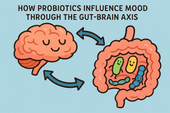
How Probiotics Influence Mood Through the Gut-Brain Axis
Discover how probiotics can do more than support your digestion—they can actually uplift your mood. This article explores the fascinating gut-brain axis and how balancing your gut bacteria through probiotics may help reduce anxiety, improve emotional stability, and support long-term mental well-being. 🌿🧠
-
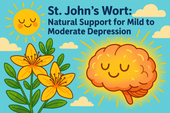
St. John’s Wort: Natural Support for Mild to Moderate Depression
Discover how St. John’s Wort, the “sunshine herb” 🌼, naturally supports mild to moderate depression. Learn how it boosts serotonin, balances mood, and promotes emotional resilience — with research showing its effectiveness compares to antidepressants, but with fewer side effects.
-
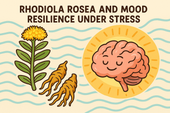
Rhodiola Rosea and Mood Resilience Under Stress
Discover how Rhodiola rosea helps your body adapt to stress 🌿. Learn how this powerful adaptogen balances cortisol, supports serotonin and dopamine, and strengthens emotional resilience — helping you stay calm, focused, and energized under pressure.
-

Chamomile and Lavender: Herbal Calm for Emotional Fluctuations
Discover how chamomile and lavender bring calm to emotional ups and downs 🌿. Learn how these two soothing herbs balance your nervous system, ease anxiety, and support restful sleep — naturally helping you find peace and emotional stability.
-
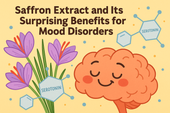
Saffron Extract and Its Surprising Benefits for Mood Disorders
Discover how saffron extract — the golden spice of joy 🌸 — can naturally support mood balance, ease anxiety, and lift mild depression. Learn what science says about its serotonin-boosting power, the ideal dosage, and how this ancient remedy compares to modern antidepressants.
-
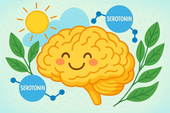
5-HTP and Serotonin: A Natural Path to Lifting Mood
Discover how 5-HTP naturally boosts serotonin 🌞 — the neurotransmitter behind mood, sleep, and emotional balance. Learn how this plant-derived compound supports happiness, reduces anxiety, and improves rest by helping your brain create more serotonin the gentle, natural way.
-
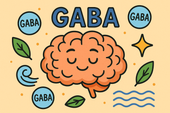
GABA Supplements for Reducing Anxiety and Mood Swings
Discover how GABA supplements can help reduce anxiety and balance mood naturally 🌿. Learn how this calming neurotransmitter works to quiet the mind, ease stress, and improve sleep — plus which nutrients and habits can boost your body’s own GABA production for long-term emotional stability.
-
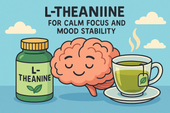
L-Theanine for Calm Focus and Mood Stability
Discover how L-theanine, the calming compound found in green tea 🍵, promotes focus, relaxation, and mood stability. Learn the science behind how it balances neurotransmitters, reduces stress hormones, and enhances clarity — helping you stay centered, calm, and productive without sedation.
-
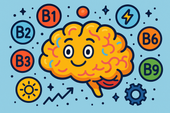
B Vitamins and Brain Chemistry: Supporting Energy and Emotional Balance
Discover how B vitamins power your brain chemistry ⚡. Learn how B6, B9, and B12 support serotonin, dopamine, and energy production — helping boost focus, mood, and emotional balance. From diet to supplements, explore how this vital nutrient group keeps your mind resilient and your energy steady.
-

N-Acetyl Cysteine (NAC) and Mood Disorders: What the Research Says
Learn how N-Acetyl Cysteine (NAC) supports brain health and mood balance 🧠. Discover how this antioxidant helps reduce oxidative stress, regulate glutamate, and improve emotional stability in depression, bipolar disorder, and anxiety — backed by cutting-edge psychiatric research.
-

Supplements for Bipolar Disorder: What May Support Stability
Discover the best supplements for bipolar disorder 🌿 that may support emotional stability and brain health. Learn how nutrients like omega-3s, magnesium, vitamin D, and NAC can help reduce inflammation, balance neurotransmitters, and complement traditional treatment safely.

















































